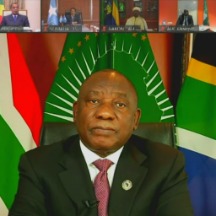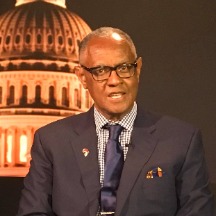“The commencement of trading under the African Continental Free Trade Area (AfCFTA) on the 1st of January 2021 is one of the most significant milestones in the continental integration project,” said Cyril Ramaphosa, President of the Republic of South Africa and Chairperson of the African Union (AU). The implementation of the AfCFTA, although delayed by the COVID-19 pandemic, is set to begin anew with a focus first on easing trade for small and medium-sized enterprises, which account for 90 percent of jobs created on the continent.
One of the signatories to the agreement, Sahrawi Arab Democratic Republic, was recently “swapped” by Donald Trump in an agreement with Israel and Morocco.
All 55 states of the African Union, except for Eritrea, signed and ratified the agreement after about 17 years of negotiation. Nigeria, Africa's largest economy, only deposited its ratification instrument on December 5 after having signed it a few weeks earlier. Eritrea is expected to sign soon.
Gyude Moore and Bogolo Kenewendo wrote in Foreign Policy, “Meanwhile, the official U.S. response to the AfCFTA has been ambivalent at best. To the chagrin of African leadership, the United States continues to negotiate a bilateral trade agreement with Kenya in the hope of developing a model that could later be applied to other countries in Africa. This effort follows a period of decline in two-way trade between the United States and Africa: Between 2014 and 2018, U.S. exports to Africa have decreased by 32 percent, while exports from Africa to the United States have decreased by 55 percent in the same period.
African Free Trade Union Starts January 1


One of the goals of the Free Trade Area is to correct the imbalance of trade with former European masters. Internal trade within the continent of 1.2 billion people currently stands at a meagre 16 percent, while 65 percent of their commerce is with European countries. AfCFTA's plan is to boost intra-African trade by 60 percent by 2034 by eliminating almost all tariffs, creating an economic bloc of $3.4 trillion.
There are still many obstacles AfCFTA must tackle including how to integrate the eight regional blocs in Africa that currently exits. One of the signatories to the agreement, Sahrawi Arab Democratic Republic, was recently “swapped” by Donald Trump in an agreement with Israel. In the agreement, As part of the deal, Trump recognized Morocco’s annexation of Western Sahara and Morocco, the Arab world’s oldest monarchy, will become the fourth Arab state in as many months to establish diplomatic relations with Israel.
Melvin Foote, president of the is hopeful that will be look upon in the future as an important milestone in the effort for a united Africa. “For sure there is a lot of work ahead to ensure that the AfCFTA does not becomes just another piece of paper— the infrastructure deficit must be addressed, political barriers have to be negotiated, and a realistic plan to engage the Diaspora, have also got to instituted. While the challenges are massive, you have to start somewhere”
Launch Ceremony
What is the African Continental Free Trade Area (AfCFTA) by Prudence Sebahizi, AU Commission
There are still many obstacles AfCFTA must tackle including how to integrate the eight regional blocs in Africa that currently exits. One of the signatories to the agreement, Sahrawi Arab Democratic Republic, was recently “swapped” by Donald Trump in an agreement with Israel. In the agreement, As part of the deal, Trump recognized Morocco’s annexation of Western Sahara and Morocco, the Arab world’s oldest monarchy, will become the fourth Arab state in as many months to establish diplomatic relations with Israel.
Melvin Foote, president of the is hopeful that will be look upon in the future as an important milestone in the effort for a united Africa. “For sure there is a lot of work ahead to ensure that the AfCFTA does not becomes just another piece of paper— the infrastructure deficit must be addressed, political barriers have to be negotiated, and a realistic plan to engage the Diaspora, have also got to instituted. While the challenges are massive, you have to start somewhere”
Launch Ceremony
What is the African Continental Free Trade Area (AfCFTA) by Prudence Sebahizi, AU Commission
Advertisers | Contact Us | Events | Links | Media Kit | Our Company | Payments Pier
Press Room | Print Cover Stories Archives | Electronic Issues and Talk Radio Archives | Writer's Guidelines






